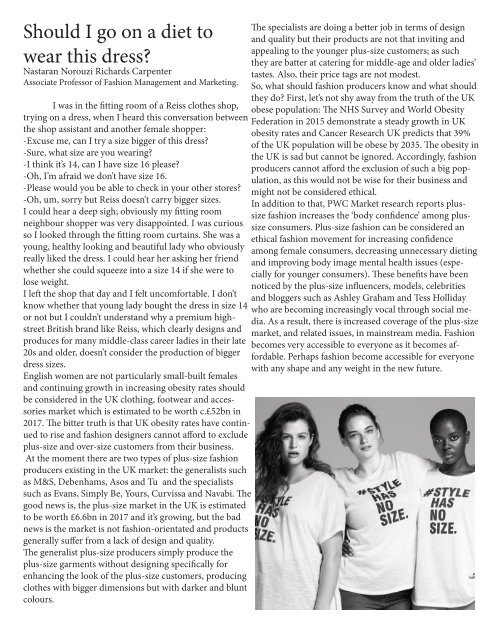RUONCAMPUS MAGAZINE FINAL Version
You also want an ePaper? Increase the reach of your titles
YUMPU automatically turns print PDFs into web optimized ePapers that Google loves.
Should I go on a diet to<br />
wear this dress?<br />
Nastaran Norouzi Richards Carpenter<br />
Associate Professor of Fashion Management and Marketing.<br />
I was in the fitting room of a Reiss clothes shop,<br />
trying on a dress, when I heard this conversation between<br />
the shop assistant and another female shopper:<br />
-Excuse me, can I try a size bigger of this dress?<br />
-Sure, what size are you wearing?<br />
-I think it’s 14, can I have size 16 please?<br />
-Oh, I’m afraid we don’t have size 16.<br />
-Please would you be able to check in your other stores?<br />
-Oh, um, sorry but Reiss doesn’t carry bigger sizes.<br />
I could hear a deep sigh; obviously my fitting room<br />
neighbour shopper was very disappointed. I was curious<br />
so I looked through the fitting room curtains. She was a<br />
young, healthy looking and beautiful lady who obviously<br />
really liked the dress. I could hear her asking her friend<br />
whether she could squeeze into a size 14 if she were to<br />
lose weight.<br />
I left the shop that day and I felt uncomfortable. I don’t<br />
know whether that young lady bought the dress in size 14<br />
or not but I couldn’t understand why a premium highstreet<br />
British brand like Reiss, which clearly designs and<br />
produces for many middle-class career ladies in their late<br />
20s and older, doesn’t consider the production of bigger<br />
dress sizes.<br />
English women are not particularly small-built females<br />
and continuing growth in increasing obesity rates should<br />
be considered in the UK clothing, footwear and accessories<br />
market which is estimated to be worth c.£52bn in<br />
2017. The bitter truth is that UK obesity rates have continued<br />
to rise and fashion designers cannot afford to exclude<br />
plus-size and over-size customers from their business.<br />
At the moment there are two types of plus-size fashion<br />
producers existing in the UK market: the generalists such<br />
as M&S, Debenhams, Asos and Tu and the specialists<br />
such as Evans, Simply Be, Yours, Curvissa and Navabi. The<br />
good news is, the plus-size market in the UK is estimated<br />
to be worth £6.6bn in 2017 and it’s growing, but the bad<br />
news is the market is not fashion-orientated and products<br />
generally suffer from a lack of design and quality.<br />
The generalist plus-size producers simply produce the<br />
plus-size garments without designing specifically for<br />
enhancing the look of the plus-size customers, producing<br />
clothes with bigger dimensions but with darker and blunt<br />
colours.<br />
The specialists are doing a better job in terms of design<br />
and quality but their products are not that inviting and<br />
appealing to the younger plus-size customers; as such<br />
they are batter at catering for middle-age and older ladies’<br />
tastes. Also, their price tags are not modest.<br />
So, what should fashion producers know and what should<br />
they do? First, let’s not shy away from the truth of the UK<br />
obese population: The NHS Survey and World Obesity<br />
Federation in 2015 demonstrate a steady growth in UK<br />
obesity rates and Cancer Research UK predicts that 39%<br />
of the UK population will be obese by 2035. The obesity in<br />
the UK is sad but cannot be ignored. Accordingly, fashion<br />
producers cannot afford the exclusion of such a big population,<br />
as this would not be wise for their business and<br />
might not be considered ethical.<br />
In addition to that, PWC Market research reports plussize<br />
fashion increases the ‘body confidence’ among plussize<br />
consumers. Plus-size fashion can be considered an<br />
ethical fashion movement for increasing confidence<br />
among female consumers, decreasing unnecessary dieting<br />
and improving body image mental health issues (especially<br />
for younger consumers). These benefits have been<br />
noticed by the plus-size influencers, models, celebrities<br />
and bloggers such as Ashley Graham and Tess Holliday<br />
who are becoming increasingly vocal through social media.<br />
As a result, there is increased coverage of the plus-size<br />
market, and related issues, in mainstream media. Fashion<br />
becomes very accessible to everyone as it becomes affordable.<br />
Perhaps fashion become accessible for everyone<br />
with any shape and any weight in the new future.


